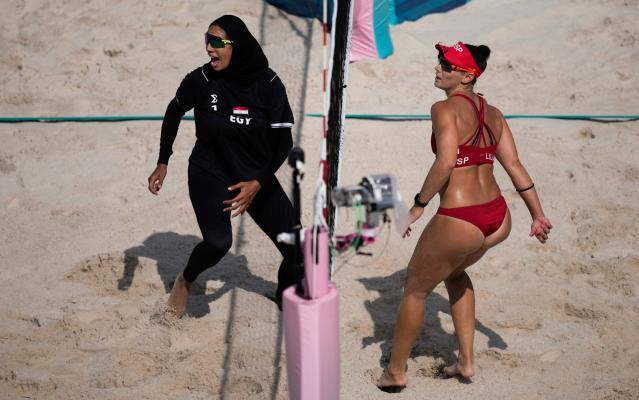
France’s debate on discrimination is not resolved by the compromise on the hijab
French sprinter Sounkamba Sylla got embroiled in a dispute with her government a few days prior to the start of the Paris Olympics regarding her ability to wear a headscarf during the opening ceremony.
However, following the discovery of a last-ditch compromise—a navy blue baseball cap hastily purchased from a high street store—the 26-year-old cruised down the Seine River grinning among other national team athletes.
Though some perceived it as the authorities softening their attitude, rights campaigners interpreted Sylla’s case as furthering discrimination against Muslims, given that French rivals are prohibited from donning the Islamic headscarf by secularist legislation.
“There are Muslims in France, and the French team is supposed to represent France,” stated Timothee Gauthierot, a basketball coach opposing the ban on headscarves. “They find a compromise to hide her headscarf – but why hide it?”
Sylla has not made any public comments, but she did share photos of herself at last week’s ceremony, which featured themes of inclusivity and tolerance, looking joyful in the headgear.
She was scheduled to compete in the mixed 4×400-meter relay heats later on Friday. According to the French Olympic Committee, she would compete wearing a cap.
Although the Sylla arrangement was a step in the right direction, Slim Ben Achour, a French lawyer who has represented women barred from wearing the hijab outside of the public sector, said it still violated Sylla’s fundamental right to freedom of religion.
Institutions in France routinely reject clothing that is thought to be a replacement for the headscarf.
“These discussions show that (the hijab ban) is not a sacrosanct principle that has to absolutely be respected,” he stated to Reuters. The reason there is an opening in Sylla’s case is that everyone is in Paris. France is unable to convey a message that could be construed as racist.
Laws in France prohibit state employees and students from wearing religious symbols or apparel in public spaces.
The government said that this was extended to France’s Olympic athletes since they were on a “public service mission”.
DIFFERENT RULES
That matches a pattern of prejudice against Muslim athletes at all levels, according to rights groups. “Ending these kinds of bans is a very easy human rights-compliant way forward if France wants to show they’re inclusive,” stated Amnesty International gender justice expert Anna Blus.
Following conversations with luxury goods company LVMH’s Berluti brand, which created the opening ceremony attire for the French participants, and French sports authorities, Sylla decided on the headgear.
Regarding how the agreement was mediated, the Ministry of Sport declined to comment, and representatives of Berluti were not immediately available for comment.
Apart from the Olympics, French sports federations have their own regulations: head coverings are prohibited for contests in football, basketball, and judo, while they are permitted in rugby, handball, and athletics.
It was unjust to ask Sylla to wear a cap, according to Souad Noubli, who left her sports teaching program because she could not wear a headscarf in her line of work.
“Let’s not act like it’s a favor for her anymore. “Her rights and her choice were not honored,” stated the 42-year-old Nanterre youth animator, who believes that the secularist concept should defend religious practice in all its forms.
The various debates concerning the position of religion and religious symbols in public in France—the country with the largest Muslim minority in Europe—have gained attention as a result of the Olympics.
Marwa Bouzayani, a steeplechase competitor from Tunisia who wears a sports hijab, stated that she disagrees with the limitation and believes that female athletes should have the freedom to choose their attire.
“Why ought she to don a cap? What makes a difference? “Is the hijab considered outdated by her government?” the 27-year-old asked Reuters during a training session.
“(A cap) can bother you, it’s not comfortable, the wind can catch it, it’s not the same as just running in the hijab.”
Masomah Ali Zada, the leader of the refugee team and a cyclist who was given shelter in France after leaving Afghanistan and donning a headscarf, responded that it was a challenging subject when asked her opinion of the cap compromise.
“I’m really happy to be in the refugees’ Olympic team and they respect me as I am,” she stated to Reuters.
All Categories
Recent Posts
Tags
+13162306000
zoneyetu@yahoo.com


